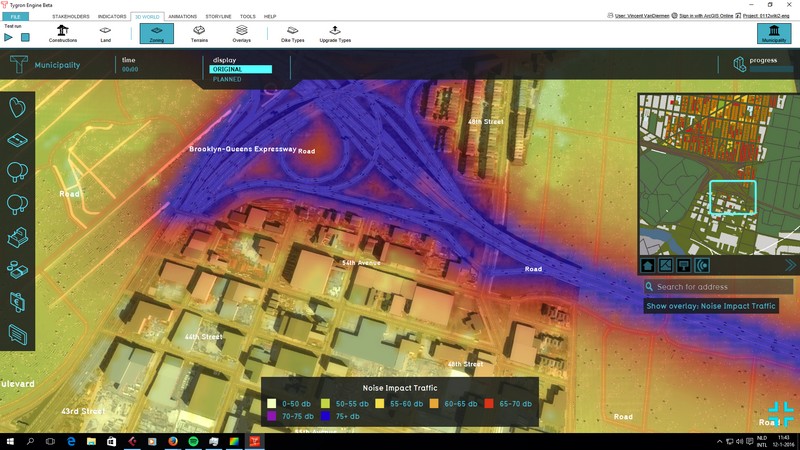Traffic Noise Overlay: Difference between revisions
No edit summary |
No edit summary |
||
| Line 19: | Line 19: | ||
==Calculation== | ==Calculation== | ||
{{main|Traffic noise formula (Traffic Noise Overlay)}} | {{main|Traffic noise formula (Traffic Noise Overlay)}} | ||
The Traffic Noise Overlay performs its calculations based on the [[Model attributes (Traffic Noise Overlay)|Overlay's Attributes]], and the [[Construction attributes (Traffic Overlay)|Attributes of roads]] present in the [[3D World]]. The calculations follow the standard rekenmethode 1 (SRM 1), as described on [http://wetten.overheid.nl/BWBR0031722/2015-07-01#BijlageIII]: | |||
The calculations follow the standard rekenmethode 1 (SRM 1), as described on [http://wetten.overheid.nl/BWBR0031722/2015-07-01#BijlageIII]: | |||
==Results== | ==Results== | ||
Revision as of 11:00, 11 February 2022

The Traffic Noise Overlay is a Grid Overlay which computes the amount of noise in dB(A) for any give location in the 3D World. The calculation takes into account traffic intensities and a number of environmental- and computation parameters to compute the noise impact. It also takes into account objects and terrain features which would block the transmission of noise.
The Overlay only computes noise from traffic. Although a background noise level can be configured, other sources of noise (such as windmills, air traffic, or factories) are explicitly excluded.
Configuration
- Main article: Model attributes (Traffic Noise Overlay)
The Traffic Distance Overlay has a number of options which allow it to be configured as desired. A configuration wizard is available.
The following aspects can be configured:
- Reference speed per vehicle type
- Noise and noise multiplies per vehicle type
- Background noise
Calculation
- Main article: Traffic noise formula (Traffic Noise Overlay)
The Traffic Noise Overlay performs its calculations based on the Overlay's Attributes, and the Attributes of roads present in the 3D World. The calculations follow the standard rekenmethode 1 (SRM 1), as described on [1]:
Results
The following result types are available as output from the traffic noise calculations:
| Icon | Result type | Unit | Mode | Description |
|---|---|---|---|---|
| NOISE_DB | dB | The amount of noise in dB experienced at any given location, based on traffic noise and background noise levels. | ||
| EMISSION | dB | The amount of noise in dB emitted by traffic at any given location. |
How-to's
References
- The overlay calculations are based on Standard Calculation Method 1 (SRM1) as defined by the dutch government: http://wetten.overheid.nl/BWBR0031722/2015-07-01#BijlageIII